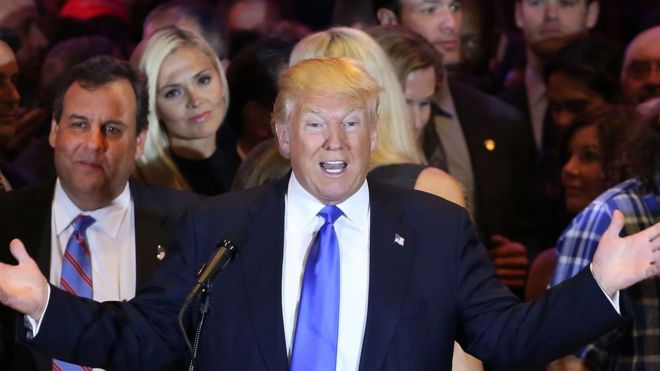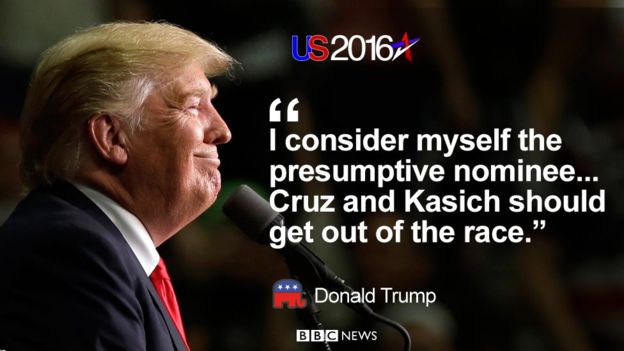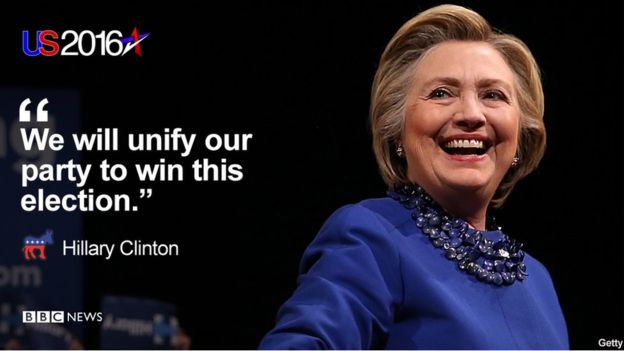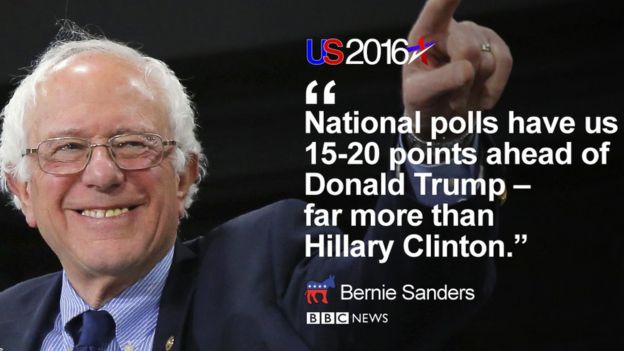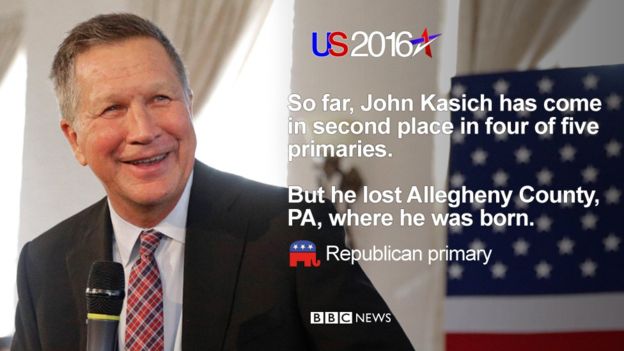Is this the end for Bernie Sanders?

Hillary Clinton may have delivered a knockout blow. Donald Trump threatens to put the #NeverTrump movement on the ropes.
The brawl that's been the 2016 presidential campaign is entering its final round, and it looks increasingly like we'll know the two contenders who will face off in the autumn title bout.
Here are four key things we learned from a decisive night in the race for the 2016 nominations.
Majority Trump
Five states, five big wins. In each of the contests Mr Trump finished above 50%. That's a key mark not just for the bounty of delegates it provides — particularly in Pennsylvania — but also because it indicates that no matter how closely John Kasich and Ted Cruz co-ordinate their campaigns, it may be hard for them to top the front-runner.
"Do you know what my ceiling is?" Mr Trump asked during his victory speech. "I think it's 100%."
The New Yorker couldn't resist taking a few shots at Ohio Governor John Kasich and "crooked" Hillary Clinton, of course, but for the second straight week he was relatively calm, focusing in particular on his economic message.
Mr Trump still has work to do before he clinches the nomination, and the Indiana contest next week looms large. If Ted Cruz can pull out a win there, then California becomes a decisive battleground.
No matter how the remaining weeks play out, however, Mr Trump will head into the Republican convention as the clear leader in both the popular vote and the delegate count — even if he doesn't reach the 1,237 number necessary to clinch the prize.
Unless the dynamics in this race shift considerably, it will be very difficult for Mr Cruz or any other Republican to make the case that Donald Trump shouldn't be the party's standard-bearer.
"I consider myself the presumptive nominee," Mr Trump said. "Senator Cruz and Governor Kasich really should get out of the race."
They're not going to follow his advice — but very soon, it may not matter.
Clinton's pivot
Hillary Clinton took the stage in Philadelphia Tuesday night as the presumptive Democratic nominee, and she sounded like it.
In a tight, focused speech she praised Mr Sanders for highlighting the problems of "unaccountable money" in politics and income inequality.
"Whether you support Senator Sanders or you support me, there's much more that unites us than divides us," she said — and continued to outline where "we Democrats agree".
From there, she pivoted to the man she will likely face off against in the general election, Donald Trump.
"Mr Trump accused me of playing the, quote, woman card," she continued. "Well, if fighting for women's health care and paid family leave and equal pay is playing the woman card, then deal me in."
The battle lines for the autumn campaign are being drawn, and Mrs Clinton is already beginning her efforts to paint her opponent as anti-woman and politically extreme. In one key line in her speech, she made a direct pitch to "thoughtful Republicans".
For every one working-class Democrat Mr Trump pries from the Democratic coalition, she may hope to pull a disaffected Republican. If liberal bogeyman Charles Koch can entertain notions of supporting Mrs Clinton, this may not be too wild-eyed a hope.
Combine that with an electoral playing field that's already tilted in her favour and what record registration among Latinos who may be chaffing at Mr Trump's rhetoric, and a winning formula is clear.
Twilight of the Sanders campaign
Bernie Sanders has a lot to be proud of, and he spent the first part of his speech tonight touting the success of his underdog campaign.
But over the past week he's gone toe-to-toe with Hillary Clinton in states across the mid-Atlantic and North East and come up short. In fact, his campaign — flush with millions in small-donor contributions — outspent the Clinton juggernaut in television advertising by a two-to-one margin in these five contests. But he only has one victory, in tiny Rhode Island, to show for it.
Part of his struggles can be explained by the nature of the primaries he was competing in, most of which were open only to registered Democrats. Mr Sanders can attribute much of his success over this campaign to the support of young and independent voters who don't traditionally participate in the Democratic primary process. When it was more difficult for them to cast their ballots, his numbers declined.
Nevertheless, he is seeking the nomination of the Democratic Party, and to carry the day he simply needed the support of more Democrats.
Earlier on Tuesday the Sanders campaign team told reporters that they would "re-assess" the situation if their man performed poorly in the day's primaries. He did.
On Tuesday night Mr Sanders released a statement saying he was staying in the race in order to get as many delegates as possible to "fight for a progressive party platform" during the Democratic National Convention.
No mention of winning the nomination at this point. There was no need to.
Kasich's flop
The states that held their primaries over the last week were always going to be difficult territory for Texas Senator Ted Cruz. His brand of evangelical conservative orthodoxy laced with a touch of libertarianism was never going to play well among the region's more moderate, working-class Republicans.
The hope for the #NeverTrump faithful was that this would be where John Kasich would flourish. Instead he flopped.
In state after state the Ohio governor was swamped by the Trump tide.
In the coming contests Mr Kasich and Mr Cruz have agreed to co-ordinate their campaigns, giving Mr Kasich a clean shot at Mr Trump in Oregon and New Mexico. If recent results are any indication, however, it seems unlikely that he will be up to the task.
Mr Kasich's campaign was resurrected in February with a second-place finish in New Hampshire thanks to Marco Rubio's surprising collapse. It was sustained in March by a win in his home state of Ohio. But outside of that, Republican voters just don't seem to be buying what John Kasich is selling.
Политика конфиденциальности | Правила пользования сайтом
